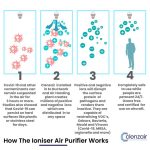Last Updated on 12 months by Francis
Negative ions are molecules that play a vital role in the quality of the air we breathe. Negative ions are produced naturally by natural environments such as waterfalls, forests, and beaches. They are also produced artificially through ionizers, and air purifiers. Studies have shown that negative ions have a significant impact on humans by improving our physical and emotional well-being. This introduction aims to explore how negative ions affect humans and their benefits on our overall health.
Contents
Understanding Negative Ions: What Are They?
Before diving into how negative ions affect humans, it’s important to understand what they are. Negative ions are oxygen atoms with an extra electron. They are naturally occurring in environments such as forests, waterfalls, and beaches. Negative ions are also generated by technology such as air purifiers, ionizers, and salt lamps.
The Science Behind Negative Ions
Negative ions have a negative charge, which means they attract positively charged particles such as dust, pollen, and bacteria. This is why negative ions are often associated with air purification and improving air quality. Negative ions can also interact with our bodies in various ways, which we’ll explore further in this article.
The Benefits of Negative Ions on Our Health
Negative ions have been studied for their potential health benefits for decades. Here are some of the ways negative ions can affect our bodies:
Improved Mood and Mental Health
Research has shown that negative ions can improve mood and reduce symptoms of depression and anxiety. Negative ions may increase the production of serotonin, a neurotransmitter that regulates mood and can improve overall well-being.
Increased Energy and Alertness
Negative ions can also increase energy levels and alertness. A study published in the International Journal of Biometeorology found that negative ions can improve cognitive performance and reduce fatigue. Negative ions may also help regulate sleep patterns, which can lead to increased energy levels during the day.
Reduced Inflammation and Pain
Negative ions have been shown to have anti-inflammatory effects. One study published in the Journal of Alternative and Complementary Medicine found that negative ion therapy reduced pain and inflammation in patients with rheumatoid arthritis. Negative ions may also improve circulation, which can help reduce pain and promote healing.
Improved Respiratory Health
Negative ions can improve respiratory health by reducing allergens, pollutants, and other harmful particles in the air. Negative ions may also improve lung function and reduce symptoms of asthma and other respiratory conditions.
Strengthened Immune System
Negative ions may also strengthen the immune system by increasing the production of white blood cells, which are responsible for fighting off infections and diseases. Negative ions may also help reduce stress, which can have a positive impact on overall health and immune function.
How to Incorporate Negative Ions into Your Environment
There are several ways to incorporate negative ions into your environment to reap their potential health benefits:
Spend Time in Nature
One of the easiest ways to increase your exposure to negative ions is to spend time in nature. Take a walk in the woods or visit a nearby beach or waterfall to breathe in the fresh, negatively charged air.
Use Technology
Technology such as air purifiers and ionizers can also generate negative ions to improve air quality and provide potential health benefits. Salt lamps are another popular way to generate negative ions in your home or office.
Practice Deep Breathing Exercises
Deep breathing exercises can also increase exposure to negative ions. Take deep breaths in areas with high levels of negative ions, such as near waterfalls or in forests.
FAQs: How do negative ions affect humans?
What are negative ions and where do they come from?
Negative ions are molecules with an extra electron that hold a negative charge. They are generated in nature through various processes such as sunlight, rain, thunderstorms, and waterfalls. Negative ions are also found in abundance near oceans and rivers, with the highest concentration of negative ions found near moving water sources.
How do negative ions impact human health?
Negative ions have been recognized for their ability to enhance human health and well-being. Studies have shown that negative ions can effectively balance serotonin levels in the brain, which contributes to regulating mood, reducing stress, and improving overall mental well-being. Negative ions have also been found to increase oxygen flow to the brain and the body, promoting improved physical endurance, alertness, and concentration.
Can negative ions help with respiratory issues?
Yes, negative ions have been found to have a positive effect on the respiratory system. They help to clear the air of pollutants, allergens, and other harmful particles, reducing the risk of respiratory infections, allergies, and asthma. Negative ions also stimulate the cilia in our respiratory system, which are the tiny hairs that help to keep our airways clean and clear.
Do negative ions have any impact on sleep?
Yes, negative ions can improve the quality and quantity of sleep. They help to reduce the levels of cortisol in the body, which is the hormone that causes stress and anxiety. Negative ions also increase the production of melatonin, which is the hormone that regulates our sleep-wake cycle. This can lead to a better quality of sleep, reducing the risk of insomnia and other sleep disorders.
Are negative ions safe for everyone?
Yes, negative ions are completely safe for everyone, including children and pregnant women. In fact, they are already present in our natural environment and have been found to have numerous health benefits. However, if you have a medical condition, it is always recommended to consult with your healthcare provider before using negative ion generators or other devices that produce negative ions.

.jpg)


.jpg)


